Beth Tabler's Blog, page 155
October 28, 2022
Review – INTERSTELLAR GUNRUNNER by James Wolanyk
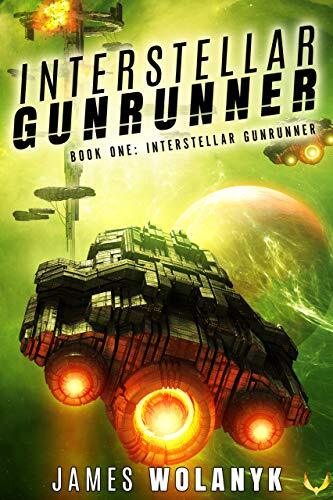 INTERSTELLAR GUNRUNNER by James Wolanyk is something that has been recommended on my feed for some time. Indeed, for years, right under THE RULES OF SUPERVILLAINY it was always being told to me that it was something I might like. The problem was there was always something else in the queue and it wasn’t like I didn’t have a bunch of other space opera books to read ahead of it. Still, I remembered the title and when I saw the book trilogy was on sale for 99c, I decided to jump at it and picked up a copy. Here’s my review of the first book, Interstellar Gunrunner, that is the first book of…the Interstellar Gunrunner trilogy. Which is how all trilogies should be titled.
INTERSTELLAR GUNRUNNER by James Wolanyk is something that has been recommended on my feed for some time. Indeed, for years, right under THE RULES OF SUPERVILLAINY it was always being told to me that it was something I might like. The problem was there was always something else in the queue and it wasn’t like I didn’t have a bunch of other space opera books to read ahead of it. Still, I remembered the title and when I saw the book trilogy was on sale for 99c, I decided to jump at it and picked up a copy. Here’s my review of the first book, Interstellar Gunrunner, that is the first book of…the Interstellar Gunrunner trilogy. Which is how all trilogies should be titled.
The premise is Bodhi Brezzek is one of the worst people in the galaxy. An arms trafficker who gleefully sells to both sides of a war within minutes of one another, manufacturing munitions that very often exist to counteract the ones he just sold, he has made a very lucrative profit from his last deal. The theocratic totalitarian Halcius Hegemony is having no end of trouble wiping out an insurgency (in part because of Bodhi’s weapons) and that sustained conflict is what keeps him in business.
Unfortunately, Bodhi is bad with money. Incredibly, obnoxiously, incredulously bad with money. He makes something like 20,000,000 credits from his last deal and proceeds to blow it all on a suite to gather all of his creditors so he can ask for more money for another scheme. As you can gather, it turns out his creditors would rather be paid instead and Bodhi is stunned because the idea of this never occurs to him. He is so incredibly confidant of his ability to charm people into purchases, he has absolutely no fallback position when they aren’t. Yes, Bodhi is used to dealing with morons and the fact that there are other people who aren’t by his standards is something he’s bad at anticipating.
What follows is a delightful story akin to the Han Solo novels or similar crime fiction IN SPACE. Bodhi must perform a task to cover all of his debts to a particularly nasty loan shark named Nerikad. Nerikad is basically a collection of sentient algae that wants him to steal something from a tropical planet full of sentient bunnies (all of them ripped like Arnie). Opposing or supporting him will be the Hegemony and the insurgency that they’re fighting there.
The biggest appeal of this book is how utterly contemptible Bodhi is. Seriously, for 90% of the book, Bodhi is reprehensible in a way that would do Edmund Blackadder proud. No secret heart of gold here, he regularly throws his business partners, crew, and innocent bystanders under the bus for the slightest gain. It’s a nice contrast to stories where the protagonist is just misunderstood or has a tragfic backstory to justify everything he does.
Indeed, the only flaw with the book and its zany con games and betrayals is the fact that the remaining 10% does have Bodhi acting like he’s suddenly developed a conscience. I didn’t buy it and was genuinely enjoying the protagonist being such an utter scumbag throughout. A guy who thinks he’s far more morally ambiguous and charming than he is. Sadly, they felt the need to give him someone redeeming qualities and I am taking off a half-point from my 4.5 score for the book otherwise.
Buy from Amazon
interstellar gunrunner•interstellar gunrunner•interstellar gunrunner•interstellar gunrunner•interstellar gunrunner•interstellar gunrunner•interstellar gunrunner•interstellar gunrunner•
The post Review – INTERSTELLAR GUNRUNNER by James Wolanyk appeared first on BEFOREWEGOBLOG.
October 27, 2022
Review – THE TALISMAN OF DELUCHA by A.J. Calvin
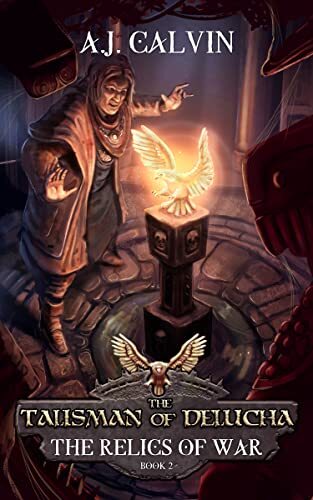 Full disclosure: I was provided an Advanced Reader Copy of this book (which has in no way influenced my review), in exchange for an honest review, which I have provided below.
Full disclosure: I was provided an Advanced Reader Copy of this book (which has in no way influenced my review), in exchange for an honest review, which I have provided below.
I continued my journey into fantasy author A.J. Calvin’s “The Relics of War” series with her follow-up to “The Moon’s Eye”, entitled “The Talisman of Delucha”. I found it to be a great second installment, and whetted my appetite for the conclusion to the trilogy, to see if the despicable Soulless can achieve their conquest of the Five Kingdoms, or if the powers arrayed against them can prevail in the face of overwhelming odds.
With most of the primary characters established in “The Moon’s Eye”, we follow these players through four main storylines, that you can guess are bound to intertwine at various points in the narrative, with stunning results.
First, the aspiring magician, Tavesin practices his skills under the tutelage of the Sorcerers of the Shining Tower. Tavesin will need to be at his most powerful, if he is to find his beloved friend Arra, whom he believes has been abducted by the Dark Tower, along with other magic apprentices. Knowing that Arra likely lies in the clutches of the evil Soulless – demon-like figures who serve an even darker master known as the Nameless – is driving Tavesin to desperation, and unpredictability. His desire to save his friend may lead him to take unwise risks that could compromise the safety of those who have sheltered and trained him in the magic arts.
Next, we learn that Ravin remains serving the Queen of Delucha as a magical advisor, conjointly training the queen and her consort – Jasom – in the arts of magic. Pursued as a love interest by the alluring but likely untrustworthy Duchess of Mers, and other ladies of the court, Ravin’s true aim is to capture Dranamir, one of the accursed Soulless, and devotes his considerable abilities to the task.
Meanwhile, Aran’daj and Jal’den continue to lead the Murkor Clan in battle against their will, fighting for the Soulless because their choice is fight, or face a horrible death at the hands of their Soulless masters. An attack by the Murkor at the Pines ends in disaster and defeat by humans including knights. The Murkor are forced to retreat when the Soulless abandon them. But Aran’daj and Jal’den are playing a dangerous game, plotting how to free themselves and those who follow them from Soulless control.
Finally, the main protagonist from “The Moon’s Eye”, Vardak, one of the Scorpion Men (half-scorpion, half-humanoid creatures from a stoic warrior culture) continues his mission to negotiate the release of his brother Travin, held captive by the Murkor clan. Besides his efforts to save his sibling, Vardak carries guilt surrounding the demise of his friend Janna, daughter of the goddess Flariel, and is seeking to bring meaning to her death. Consequently, Vardak is searching for guidance from the Wizards at Dar Daelad. Accompanying him are the knight Emra, the Airess Dannes, the soldier Lucas, and other bold companions. But when a haunted sword comes into Emra’s possession, it changes the course of Vardak’s quest, and potentially the fate of the world.
As with the previous book, Calvin deftly characterizes a central group of players, which includes beings of diverse races including the Scorpion Men, the Murkors, magicians, the undead Soulless, and more. The varying motivations, desires, and goals of the characters, and how they conflict and converge, is very well done.
I believe the Soulless, clearly the villains of the books, are emerging as my favourite characters to read. Their infighting, deviousness, and mercurial natures make for entertaining reading. With Dranamir’s hate of Alyra, and competing for the attention of their Nameless Master, Jannyn’s lust for Alyra, Kama’s cunning manipulation of the Murkor, while seemingly valuing them beyond what is typical for the callous Soulless, and the enigma that is Garin, the Soulless are a fascinating bunch. Emra also emerged as a favourite, for me outshining Vardak as a charismatic lead. I’m hoping to see more of her in the next book.
Calvin’s prose continues to be strong, and her battle scenes are well-crafted and intense. As I stated in my review of “The Moon’s Eye”, this series is shaping up to be one with a classic fantasy feel, well-paced, well-written, with very good character work, and quite enjoyable to read. It does not necessarily provide as compelling themes as I have read in some other works, but what it does well (aforementioned), it does VERY well, and that is a lot.
“The Talisman of Delucha” is definitely a recommended read, and as noted above, I’m very much looking forward to reading “The War of the Nameless”, the final book in the series.
4.5 stars out of 5!
Buy from Amazon
talisman of delucha•talisman of delucha•talisman of delucha•talisman of delucha•talisman of delucha•talisman of delucha•talisman of delucha•talisman of delucha•
The post Review – THE TALISMAN OF DELUCHA by A.J. Calvin appeared first on BEFOREWEGOBLOG.
REVIEW – GOLDSONG BY BETH HUDSON
by BETH HUDSON
What is it about?
A reluctant king. A legendary harp. A city divided.
Traedis Atenel never expected to find herself a king. When she fled her city and her family, all she wanted was to become a bard and make her own way in the world. Now, touched by strange magic and harrowed by imprisonment, she rules the city she once hated.
Despised by its people, she embarks on a mission to reform what was once known as the City of Assassins. After all, she has spoken with gods, walked with dragons, and learned the mysteries of bardic magic. When a demon comes calling, it reawakens a curse that could destroy Traedis and her city.
Supported by her sister Vandeyr, a former assassin, and with the aid of an enchanted harp, Traedis uncovers long-buried secrets and forges alliances where she least expects them. But elemental spirits, ghosts, and hostile powers stand in her way. Some of them will help her. Some will oppose her.
Some of them are certain to be from her own family.
My Thoughts
I had the absolute pleasure of receiving an ARC of “Goldsong” by the amazing Beth Hudson. This book truly astounded, it was incredible! After reading the novel, I could not believe I had not heard more about Hudson – an experienced fantasy author – and her outstanding work!
In “Goldsong”, Hudson has woven an inventive and distinct universe full of unique kingdoms, diverse peoples, deep and ancient magic, gods, demons, prophecy, magical instruments and weapons, and all the elements a reader would ever want in any fantasy novel.
Hudson’s writing is atmospheric, but never overdone. Her prose is as lyrical as the harp that is the talisman of King Traedis’ magic power (that power known as “falmyros”, in the novel). The writing is simply delightful and always appropriately descriptive, whether it be with respect to how a character looks, the setting, or the mood / tone Hudson attempts to convey in a particular passage. I found myself re-reading certain paragraphs just for the joy of it, hence why it took me a bit longer to finish the entire book.
The story revolves around the aforementioned female king, who is the heroine of the book, and a courageous, thoughtful, and extremely likeable character. Traedis is cerebral, kind, and puts her responsibilities as monarch above all else. Although many readers tire of truly “good” and noble heroes, I certainly did not tire of this one! I loved this protagonist, and her benevolence and altruism shone through, making her easy to root for. One of the things I enjoyed the most about Traedis was her humility – she knows she doesn’t know everything, and needs to keep learning, and seek help when necessary, if she is to triumph over adversity.
Traedis has been imprisoned prior to her ascension to the throne of the kingdom of Tolin, but her troubles have not ceased by any means with her recent freedom, and new sovereignty – if anything they have just begun. Tolin is weak from a military standpoint, and enjoys a fragile peace, surrounded by far more powerful rivals. The spectre of a powerful demon lurking beneath Tolin threatens to obliterate the realm at any time, and a benevolent savior-God who helped save the city previously has been destroyed. The immediate family of Traedis are mostly conniving enemies, with the exception of her sister Vandeyr, who is a redoubtable warrior and assassin, the commander of Traedis’ personal bodyguard, and one of the king’s closest friends and allies, albeit a prickly one. Traedis must deal with political intrigue, battle malevolent deities, ward off feckless suitors for her hand, and stay alive in the face of plots against her life, while trying to save her kingdom.
The book is lush with compelling characters of all levels of importance to the plot. Consequently, I would have wished for a list of these excellent secondary and tertiary characters to be included, especially to keep track of the various gods / demons, and their powers, and the nations and their nobility, but that is the only minor criticism I can find of this superlative novel.
If you enjoy an extremely well-crafted system of magic and magical elements, then you will certainly revel in “Goldsong”. While there is no real large-scale battle pieces in the novel, that certainly did not diminish from my reading enjoyment, as all the mythology and mysticism certainly compensated for the overall lack of war and battle-excitement. Hudson keeps the reader engaged, and truly invested in what happens to Traedis and Tolin. There is tension and suspense throughout the novel, and a palpable sense of danger / impending doom that will keep the reader page-turning to the end.
I highly recommend “Goldsong” to fantasy fans, as a fantastic read! Kudos to Beth Hudson, and I cant’ wait to read her next book!
Check Out some of our other reviewsReview – The Final Girl Support Group by Grady Hendrix
The post REVIEW – GOLDSONG BY BETH HUDSON appeared first on BEFOREWEGOBLOG.
Television Review – House of the Dragon Season 1
 HOUSE OF THE DRAGON is a series I have a lot of mixed feelings on, mostly positive, but some negative. I was supporting an adaptation of the Dance of the Dragons from the very beginning. It’s one of the most important events of Westeros’ history as well as one of the few periods with as much intrigue as well as (to be honest) trashy relationships to make a series. I not just loved it from FIRE AND BLOOD but THE WORLD OF FIRE AND ICE as well as the two novellas (“The Princess and the Queen”, “The Rogue Prince”) that I read long before this. I think it could have easily been a fantastic seven season series.
HOUSE OF THE DRAGON is a series I have a lot of mixed feelings on, mostly positive, but some negative. I was supporting an adaptation of the Dance of the Dragons from the very beginning. It’s one of the most important events of Westeros’ history as well as one of the few periods with as much intrigue as well as (to be honest) trashy relationships to make a series. I not just loved it from FIRE AND BLOOD but THE WORLD OF FIRE AND ICE as well as the two novellas (“The Princess and the Queen”, “The Rogue Prince”) that I read long before this. I think it could have easily been a fantastic seven season series.
Sadly, it’s going to be a three- or four-season series. This is something I will bring up as the biggest weakness of House of Dragons in that this show really runs past its most interesting concepts. The first eight episodes go through about twenty years of time with barely a moment to pause for breath. We could have easily spent two or three seasons dealing with just the build-up to the Dance with non-book fangs strung along by things like Criston Cole/Rhaenyra, Laena the Dragon Rider, and the shocking swerve of Laenor being gay.
I am not going to complain too much about the wasted opportunities, though, because I am so glad to have George R.R. Martin’s work once more onscreen. In the end, I believe fidelity to his source material is the primary source for the success of HBO’s fantasy milleu. When they stick close to the source material, they succeed and when they drift apart, they fail. I may think there’s some places they can and did improve on George’s work (I think the Velaryon race lift was brilliant and also appreciated the changes to good king Viserys) but really it’s the added fidelity to the source material that made HOTD stand above the final seasons of Game of Thrones.
The premise for those who haven’t experienced the joys of the show is that it is 400 years before the events of Game of Thrones. King Viserys (Paddy Considine) is the monarch of Westeros after being selected as heir despite his older cousin, Rhaenys, having her own claim. He is a mediocre man, easily led around by his Hand, and Small Council. Events lead him to remove his brother, Daemon (Matt Smith), from the line of succession for his daughter, Rhaenyra (Mily Alcock and Emma D’Arcy).
This is already a big issue for the patriarchal sexist culture of Westeros but becomes even worse when Otto Hightower (Rhys Ifans) and his daughter, Alicent Hightower (Emily Carey and Olivia Cooke), scheme to place the king’s later-born son, Aegon II, on the throne. In the show but not the book, Alicent and Rhaenyra begin as good friends. What follows is essentially ten episodes of palace intrigue, marriages, deaths, and other business that leads to them being on opposite sides of a civil war.
There’s a lot to recommend about the show and I would love to give this a ten out of ten. But I can’t help but feel like it is “yada-yada-ing” past the good parts. The effects are great, the acting is good, and the dragons are dragons. The sets and costuming is a step up from Game of Thrones as well. I’m not here for the CGI dragons but I’m not-not here for the dragons if you catch my drift.
Some of the characters suffered from changes in the books as Alicent Hightower’s literary straightforward scheming evil matriarch bears little resemblance to the show’s woman who just wants to do the right thing yet keeps making the worst possible decisions. Daemon also seems to zigzag from being a complete monster to someone showing a good deal more humanity. Other characters, like Mysaria, just get stuck with outrageously bad directing. Seriously, who gave her that accent versus asking her to speak with her normal one? Others get expanded on like Laenor being a badass warrior AND gay.
Still, overall, it was a victim of its own premise. They didn’t want to commit the time needed to developing the drama and inter-family rivalries that the material warranted. They wanted to jump to the war directly and I’m of the mind that is the least interesting part of the story. The characters also suffered a bit for the fact they needed to be antagonistic yet not hate one another when one or the other would be much better.
8/10
HOUSE OF THE DRAGON•HOUSE OF THE DRAGON•HOUSE OF THE DRAGON•HOUSE OF THE DRAGON•HOUSE OF THE DRAGON•HOUSE OF THE DRAGON•HOUSE OF THE DRAGON•HOUSE OF THE DRAGON•
The post Television Review – House of the Dragon Season 1 appeared first on BEFOREWEGOBLOG.
October 26, 2022
Review – Babel, or the Necessity of Violence: an Arcane History of the Oxford Translators’ Revolution by R.F. Kuang
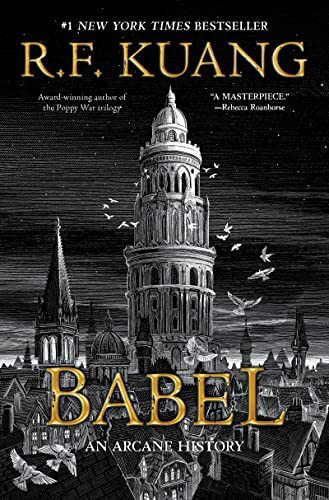 An act of translation is an act of betrayal. That quote sums up the themes of Babel, Or the Necessity of Violence: An Arcane History of the Oxford Translator’s Revolution by R.F. Kuang.
An act of translation is an act of betrayal. That quote sums up the themes of Babel, Or the Necessity of Violence: An Arcane History of the Oxford Translator’s Revolution by R.F. Kuang.
Babel is a tower in Oxford dedicated to translation. Translation is key to magic in this setting, and as such, the key to power and maintenance of empire. There are two necessities to magic: silver (the more the better) and match-pairs of words in two languages. The discrepancies between their meanings, carved into silver, is where magic comes from.
The protagonist is Robin Swift, a Cantonese boy who is taken from his dying mother in the slums back to Britain by his father, a professor at Babel. This is a common tactic, where they will take children who have a language underrepresented at Babel, then teach them English, Latin, Greek, and other languages. Robin Swift is not his birth name, which is lost, but him picking a name for the ease of English speakers.
He meets his cohort of friends, and studies hard, hoping to become another Babbler and more importantly one able to work on the silver bars with match-pairs. The opening of the book is slow, building the world in a thousand small ways and making it feel fleshed out. And not just the setting, but the character dynamics of Robin and his cohort, all of which is integral to the back half of the book. They all have these glorious days ahead of them, lifetimes of leisure if they simply do what they’re told. At the same time, the work of the silver bars they’re making makes life more difficult for regular labourers whose work is being usurped by this magic.
The details of academia are intruded upon occasionally by Griffin, a former student now a member of the Hermes Society. They work against Babel, mostly in small ways, and Griffin wants Robin to steal silver bars from Babel. Griffin has a similar backstory to Robin (they even both stayed in the same room, years apart, and Robin originally views him as a doppleganger) but is significantly more paranoid and violent. He won’t answer any of Robin’s reasonable questions because he knows what will happen if the wrong person finds out about any of it.
As the book heads towards the ending, it becomes very evident that Griffin’s paranoia is justified, and the back half of the book maintains the first half’s slow, detail-oriented nature while ramping up the tension and not letting it flag for a moment.
One of the strongest parts of this book is the way every single part of it comes back to translation. The book keeps dragging everything back to that conceit. The magic system, the inventions that arose from it or were adapted by it, and of course the academic:
‘Translators are always being accused of faithfulness,’ boomed Professor Playfair. ‘So what does that entail, this faithfulness? Fidelity to whom? The text? The audience? The author? Is fidelity separate from style? From beauty? Let us begin with what Dryden said about The Aeneid. ‘I have endeavored to make Virgil speak such English as he would himself have spoken, if he had been born in England, and in this present age.’
The book also footnotes plenty of the additional information. Some of these offer more explanation of real historical or linguistic facts, and some are in-world explanations for differences between this setting and the historical record, and some explain secondary character’s backstories in a way that otherwise wouldn’t fit into the text. For example, in a discussion on testing:
…fourth years were subject to what was called the ‘door test’ in which recent examinees lined up to walk through the entrance the morning after grading was finished. Those who had passed would step through the door with no trouble; those who failed would be treated by the tower as trespassers and suffer whatever violent punishment the current wards were designed to inflict. This practice was finally abolished on the grounds that maiming was not proportionate punishment for academic underperformance, but Professor Playfair still lobbied annually to bring it back.
I expect this book will end up with numerous nominations for SFF awards, and it will absolutely have earned every single one.This book has easily been my favorite book I’ve read this year.
Buy from Amazon
Babel, or the Necessity of Violence: an Arcane History of the Oxford Translators’ Revolution•Babel, or the Necessity of Violence: an Arcane History of the Oxford Translators’ Revolution•Babel, or the Necessity of Violence: an Arcane History of the Oxford Translators’ Revolution•Babel, or the Necessity of Violence: an Arcane History of the Oxford Translators’ Revolution•Babel, or the Necessity of Violence: an Arcane History of the Oxford Translators’ Revolution•Babel, or the Necessity of Violence: an Arcane History of the Oxford Translators’ Revolution•Babel, or the Necessity of Violence: an Arcane History of the Oxford Translators’ Revolution•Babel, or the Necessity of Violence: an Arcane History of the Oxford Translators’ Revolution•
The post Review – Babel, or the Necessity of Violence: an Arcane History of the Oxford Translators’ Revolution by R.F. Kuang appeared first on BEFOREWEGOBLOG.
Review – SHATTERED DREAMS by Ulff Lehmann
 SHATTERED DREAMS by Ulff Lehmann is a grimdark low fantasy epic which immediately draws comparisons to A Game of Thrones for the fact it is a multi-perspective view on an invasion of a Medieval country by its northern neighbors. It deals with the supernatural, politics, and violence in a non-romanticized way which works well for bringing about this is a gritty world where people are killed for trivial reasons. One of the best moments of the book is at the start when there’s a casual murder in the street and no one dares lift a finger.
SHATTERED DREAMS by Ulff Lehmann is a grimdark low fantasy epic which immediately draws comparisons to A Game of Thrones for the fact it is a multi-perspective view on an invasion of a Medieval country by its northern neighbors. It deals with the supernatural, politics, and violence in a non-romanticized way which works well for bringing about this is a gritty world where people are killed for trivial reasons. One of the best moments of the book is at the start when there’s a casual murder in the street and no one dares lift a finger.
The short version of the plot, which is a bit of an oxymoron given this is an epic, is the kingdom of Danastaer is being invaded by Chanastardh. The latter already has a huge advantage in terms of soldiers and resources but they’ve also gained a new, seemingly insurmountable one, in magic. This despite the fact magic has been missing for a long time. Five individuals follow this invasion from their perspective.
Mercenary Drangar Ralgon is forced out of self-imposed exile even though he is suffering from severe mental trauma due to an incident where he committed a terrible crime. The holy warrior Kildanor, meanwhile, tries to find the enemies’ plans so he can deduce how to stop this dreadful invasion. The sorceress Ealisaid awakens from magical hibernation to find a world where culture has been virtually wiped out and replaced by brutish warlords. The politically savvy Anne struggles to protect her family’s position when the rule of law takes a backseat to practicality. Finally, the elf Lloreanthoran is sent by his people to recover a cursed book.
The biggest criticism I have for the book is it switches around a great deal and deals with a lot of plot threads that get left to future books to resolve. I can’t help but think the book might have been improved if it had stuck with a somewhat smaller cast of individuals or even followed a single perspective per book. Drangar’s story was the most interesting to me and the most traditionally “grimdark” as it dealt with a soldier suffering PTSD before it was ever diagnosed in a society that reveres violence. It’s pretty far removed from an elf seeking a cursed magical book while he chats with his talking squirrel Bright Eyes (who is awesome, BTW). The book also stops at the end versus resolving most of its plot points and ends on a cliffhanger.
The book also suffers a bit from the naming conventions issue which plague some fantasy novels. Keeping straight an entire new world and all of its terminology as well as characters is a hard task, especially when you have so many like Ulff Lehmann’s new world. This is a book which would have benefited from a glossary at the start or, again, easing the reader into things. Instead, it dumps you right in the middle of things and lets you play catch up. Then again, maybe it’s me as it took me three reads to get A Game of Thrones mastered. I may just have the attention span of…hey, what’s that!
With my criticism out of the way, I have to say I really like Ulff Lehmann’s writing style. There’s about four or five interesting books spread across Shattered Dreams and all of them are interesting. He has a way of taking high fantasy concepts like elves, archwizards, and world-ending threats then treating them in the most gritty unromantic manner possible. This is a world where wizard fireballs may fly at people but it will describe people burning to death followed by their ashen corpses getting trodden on by the invaders they failed to stop.
The handling of religion in the world is also something I was really interested in as we have several mutually contradictory but true faiths in the setting. There’s no real substitute Catholic Church in the setting but “civilized” worship and the more wild pagan warrior cults which Kildanor is a part of yet have no real place in modern society–at least until things start to go to hell. I would have read a book entirely about them.
I also want to praise Ulff Lehmann’s handling of Medieval combat and action scenes. The battles are brutal and bloody with a keen eye to detail. This isn’t a place where people have long sword-fights but a person is struck then is either wounded (and probably bleeding out) or dead. He also actually has people surrender, which is something that I think way too few fantasy novels bother with. Way too many characters in fantasy are fanatics for their causes.
In conclusion, I recommend reading Shattered Dreams and picked up the sequel as soon as I finished the first book. This is a solid story with great characters as well as action scenes. The audiobook version just came out and I think I recommend it over the regular text version. The narrator just brings some real feeling to the characters that improves an already good story.
Buy from Amazon
Shattered Dreams•Shattered Dreams•Shattered Dreams•Shattered Dreams•Shattered Dreams•Shattered Dreams•Shattered Dreams•Shattered Dreams•
The post Review – SHATTERED DREAMS by Ulff Lehmann appeared first on BEFOREWEGOBLOG.
Television Review – House of the Dragon S1E10 “The Black Queen”
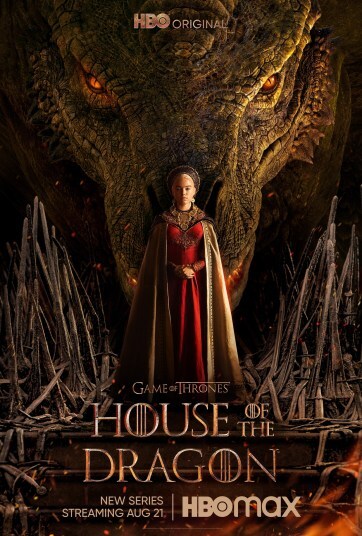 Do you hate the Greens? I know I do. George R.R. Martin stated when he wrote The Dance of the Dragons, he expected fans to be divided on which side to support. Then he found out that it was something like 90% in support of the Blacks and 10% in support of the Greens. The show has actually probably modified those numbers but it’s now, 80% support of the Blacks and 20% people who think the Greens aren’t being portrayed right due to treating them as the scumbags they are.
Do you hate the Greens? I know I do. George R.R. Martin stated when he wrote The Dance of the Dragons, he expected fans to be divided on which side to support. Then he found out that it was something like 90% in support of the Blacks and 10% in support of the Greens. The show has actually probably modified those numbers but it’s now, 80% support of the Blacks and 20% people who think the Greens aren’t being portrayed right due to treating them as the scumbags they are.
I admit, if you couldn’t tell, I’m a bit biased in my Pro-Rhaenyra support. I think the Greens being a bunch of scheming evil bastards is one of the things necessary to give any weight to the Dance of the Dragons. I feel like they should be the most contemptible scummy monsters imaginable while the Blacks should be antiheroes who are facing someone worse with just a DASH of a question whether it matters which side is on the throne because the common people will suffer the most no matter what.
However, whether or not you support #TeamAlicent or #TeamRhaenyra, the fact is you’ve been waiting for the civil war to happen between House Targaryen’s three branches. Yes, I’m throwing in the Velaryons there. Everyone knew there was eventually going to be a war between the dragonriders and we all just wanted to see how it would come about. Indeed, HBO executives reportedly wanted to start with the Dance of the Dragons and had to be persuaded by George R.R. Martin to give it a season of build-up.
The premise is that Rhaenys arrived at Dragonstone and tells Daemon and Rhaenyra that Aegon has crowned himself King of Westeros. Rhaneyra is furious but not quite ready to start a war since it’s clear that not nearly the level of support she expects is available and House Velayron is an uncertain ally at best. Corys and Rhaenys decide to throw their lot in with Rhaenyra anyway, mostly because Rhaenyra is showing restraint, but Otto provides an unexpected offer of terms that would allow her to back down with dignity. Daemon, of course, is furious and almost strangles his wife over it.
 What follows is an interesting depiction of Rhaenyra’s mindset as she really does want to be a good ruler and not tear the realm apart. I like Daemon’s reaction, though, because he points out Viserys may have been a fan of omens as well as prophecies because it allowed him to think he was more important than he was–a mediocore king over an utterly uninteresting time. However, the losses she suffers in this episode pile up with her father dying, her baby being stillborn, and the horrifying death of one of her sons. I can understand when and where she breaks in deciding to burn them all ala Aerys II.
What follows is an interesting depiction of Rhaenyra’s mindset as she really does want to be a good ruler and not tear the realm apart. I like Daemon’s reaction, though, because he points out Viserys may have been a fan of omens as well as prophecies because it allowed him to think he was more important than he was–a mediocore king over an utterly uninteresting time. However, the losses she suffers in this episode pile up with her father dying, her baby being stillborn, and the horrifying death of one of her sons. I can understand when and where she breaks in deciding to burn them all ala Aerys II.
Speaking of which, the actual beginning of the Dance is interesting to interpret from the perspective that Aemond didn’t intend to kill his nephew. He was clearly interested in scaring the living crap out of him by chasing him down but lost control of the world’s largest dragon. Which is a a nice callback to Viserys trying to warn everyone that the dragons are not really under their control. It’s also still Aemond’s fault, like aiming a gun at his nephew to scare him only for it to go off.
 This episode was tense and built on a lot of the things I liked about the previous episodes. As stated, without the time jumps, the show feels much-much stronger. We needed the cast to be able to follow-up on events from story to story. Plot elements are also not being tossed away like Corys thinking Rhaenyra had something to do with Laenor’s death. I’m not sure I quite buy the fact that he still intends to support her but since he does view her children as his grandchildren, maybe that’s enough.
This episode was tense and built on a lot of the things I liked about the previous episodes. As stated, without the time jumps, the show feels much-much stronger. We needed the cast to be able to follow-up on events from story to story. Plot elements are also not being tossed away like Corys thinking Rhaenyra had something to do with Laenor’s death. I’m not sure I quite buy the fact that he still intends to support her but since he does view her children as his grandchildren, maybe that’s enough.
Overall, I’ve had my issues with the season. I’ve felt the time-jumps have absolutely killed the pacing, that some of the plot twists were unnecessary (like Viserys’ delerium being misinterpreted or Criston Cole not getting any punishment for multiple murders), Alicent’s characterization has been all over the place, and way too many deleted scenes. They cut away a lot of scenes that deserved to be in the story. Still, I think we’ve finally reached a point where actions can be properly followed up on.
8/10
Visit HBO for more Information
HOUSE OF THE DRAGON•HOUSE OF THE DRAGON•HOUSE OF THE DRAGON•HOUSE OF THE DRAGON•HOUSE OF THE DRAGON•HOUSE OF THE DRAGON•HOUSE OF THE DRAGON•HOUSE OF THE DRAGON•
The post Television Review – House of the Dragon S1E10 “The Black Queen” appeared first on BEFOREWEGOBLOG.
October 24, 2022
#SPFBO8 Finalist Announcement!
Beth: What a contest for the BWGB team! This is my third year being a part of this contest and the second year of running a team and I have never seen a group as deep and brimming with talent as our pool is.
Which made things difficult..
In all honesty I can see any of our semi-finalists going through. Each of them had qualities that many of us seek out in novels. Even those novels that we were sadly forced to cut early in the competition enthralled many of our wonderful team and instead of finishing only a portion of the novel, they read the entire book outright. We also had plenty of positive things to say about every single book in our group.
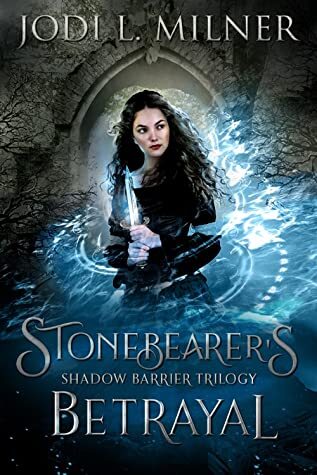 I want to talk about two of the books I wrote reviews for, Stonebearer’s Betrayal by Jodi L. Milner and A Journey of Black and Red by Alex. Because of this competition I have found two new series to plow through. Both entirely different and outside of the normal style books I read. I read fairly heavy dark fantasy, Grimdark, and horror. Yet both series have their hooks in me. And that is what the joy of the competition is, I think. Everyone wants the selfie stick of course, but what I see happening more often is that these authors put their hearts out there in the form of prose and us readers scoop them up and hold them close to our chest. Is every reader making a connection? No. But a whole lot of them are, myself included and there is a bit of magic in that.
I want to talk about two of the books I wrote reviews for, Stonebearer’s Betrayal by Jodi L. Milner and A Journey of Black and Red by Alex. Because of this competition I have found two new series to plow through. Both entirely different and outside of the normal style books I read. I read fairly heavy dark fantasy, Grimdark, and horror. Yet both series have their hooks in me. And that is what the joy of the competition is, I think. Everyone wants the selfie stick of course, but what I see happening more often is that these authors put their hearts out there in the form of prose and us readers scoop them up and hold them close to our chest. Is every reader making a connection? No. But a whole lot of them are, myself included and there is a bit of magic in that.
Dan: This is my first year as a judge, and WOW what a great lot of books we drew! I was expecting a mixed bag in terms of quality, but everything I read was really solid. Even our cuts were professional-quality books. That said, a few stood out from the rest, and I’d like to say a few words about them.
Thrice by Andrew Meredith is just such a well-done small-scale fantasy, which I crave. Epic is great, but smaller stories are my wheelhouse, and this one really told a great story in a compact format. Great writing, characters, and descriptions, and a main character who’s a needlemaker, of all things!
The Thirteenth Hour by Trudie Skies is a truly unique, immersive world quite unlike any other fantasy I’ve read. Gaslamp fantasy with magical tech, cruel gods, and themes of social inequality, plus some nice hints of romance, which I gather will be borne out in the future books.
Baker Thief by Claudie Arsenault is a perfectly queernormative fantasy mystery that does outstanding work with complex gender identities and brings a cozy aspect and a unique romance arc that pairs perfectly with the mystery.
Spirits of Vengeance by Rob J. Hayes has some incredible character work and worldbuilding, and some fantastic fight scenes. Reading this book is uncovering layer after layer of mystery and intrigue in this one-of-a-kind Asian-inspired fantasy. 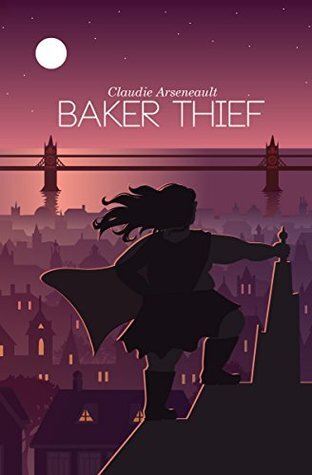 I consider all of these books to be premium works of fantasy literature that deserve readers’ attention, and I’m thrilled to have had the chance to read these for SPFBO. I can’t wait to see what comes next in the finals!
I consider all of these books to be premium works of fantasy literature that deserve readers’ attention, and I’m thrilled to have had the chance to read these for SPFBO. I can’t wait to see what comes next in the finals!
Whitney: I’m here with Dan in the newbies group and all I can say is, “WOW!” The dedication of the judging teams to be supportive, encouraging, fair, and honest is truly inspiring. Everyone at BWGB, and I’m sure the other teams as well, frets over each review and cut like a teenager worrying over a new hairstyle.
Aside from the amazing experience of being part of a judging team, the opportunity to read some truly stellar fantasy fiction by fearless writers is such an enormous privilege! I plowed through my initial draw of books pretty quickly and let me tell you, there wasn’t a dud in the bunch. The Seventh Cadence by Jim Wilbourne was an excellent foray into epic, intricate world building and magic craft. John Palladino wrangles a vast array of colorful, complicated characters in The Trials of Ashmount. As good as these stories are (and yes, they ARE!), there were minor disconnects for me as a reader which kept me from putting them forward as potential semi-finalists. Still, this won’t stop me from recommending them to fellow fantasy fanatics. They deserve a place on every magical bookshelf.
Envy by Tim Beeden ticked all the semi- boxes for me. I loved everything about this one. The relationships, the world, the character development, thematic elements, the journey…pick an element, I dug it. Enough to read it three times. And, I asked a fellow judge to read it just to make sure I wasn’t completely off my rocker. I wasn’t! (Always good to know.) She loved it too. Whew!
I didn’t stop with just the books I was assigned. I also read selections from other judges’ lists. (Not necessarily because they wanted me to read them…I’m just greedy.) Dan previously mentioned Thrice by Andrew Meredith and The Thirteenth Hour by Trudie Skies, and Spirits of Vengeance by Rob J. Hayes. Let me tell you, these books are EXCELLENT! Thrice is absolutely precious in the purest, coziest, non-saccharine sense of the word. I read Thirteenth as an ARC and it has Stuck. With. Me. So deftly and intricately constructed. Just delicious. Spirits dropped me into a Asian-inspired fantasy corner and I was gloriously out of my element.
The depth and breadth of talent in this year’s competition is breath-taking and I can hardly wait to see which book comes out on top!
Tyra: I first discovered SPFBO during the finalist phase of SPFBO 6 and I’ve been enamored with the creativity and talent that we see each year ever since. Each year I continue to read books that typically would not land on my shelf and every year I find new favorites. Last year I only judged the finalist pool with FanFiAddict so this year was my first experience being around for the first cuts and the whole pool of 30 books. The team at Before We Go Blog has been incredible, and we seriously went back and forth many times because this pool was so challenging. There is truly something for everyone in our list of semi-finalists.
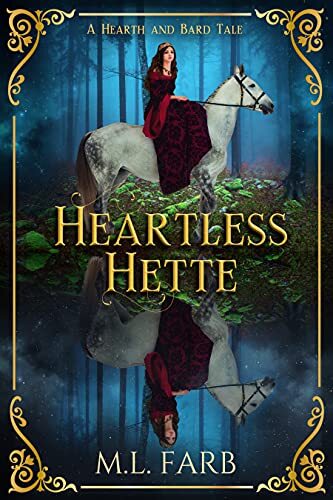 Heartless Hette is a fairytale retelling and has a gritty protagonist ready to persevere through all her setbacks. The Order: Shadow of the Assassin is a prequel novella to a greater series but you’d never know that. It stands on its own as a story of a father balanced between hard choices and protecting his family.
Heartless Hette is a fairytale retelling and has a gritty protagonist ready to persevere through all her setbacks. The Order: Shadow of the Assassin is a prequel novella to a greater series but you’d never know that. It stands on its own as a story of a father balanced between hard choices and protecting his family.
Jason: Wow. Just wow. This is my second full year as a judge with Before We Go Blog and I can’t adequately describe how exciting this batch of books was for us as a team. This has been an extraordinary first round with a lot of great books to sift through. I won’t rehash what everyone has already said above, but I do want to note how difficult it was for us to pick a finalist this year. This team had multiple conversations about which book should advance as our finalist with messages flowing back and forth and lengthy discussion over many days because we were all passionate about these books (as you can see above). I’m thankful for everyone on this team who each bring different perspectives to the process and our discussions. Each person on this team has made me contemplate the pros and cons of any selection in new and helpful ways. Please know whether you are one of the authors in our batch or whether you are an observer following the competition this selection was not taken lightly.
Finally I want to thank the authors in our batch for sharing your stories with us. It takes a lot of faith and guts to pour your heart and soul onto the page and then offer it up for critique and judgement in a competition such as this one. I have found new authors to follow and new story lines to explore which would not have been the case if you had not taken the chance. So thank you and please keep telling your stories!
Ryan: This really was a strong batch, and our judging team was filled with praise for the books. I’ve been in the contest a few times and it was great seeing how the SPFBO works from the other side. I agree with the other judges and I also want to highlight Tom Mock’s The Long Nights, which was a vampire story with such a strong sense of voice and setting that it really stood out. The blues clubs and the art shows and the noir under it all really stood out as an exceptionally well-done setting.
Krystle: Ultimately, we had to settle on one book. No matter how strong our batch, no matter how many books we fell in love with, it was time to select one finalist. It came down to a vote. Which one book stood out the most, which ONE book captured the biggest pieces of each reviewer’s hearts? Eventually it became clear that it was going to be a choice between two books that just had that edge. 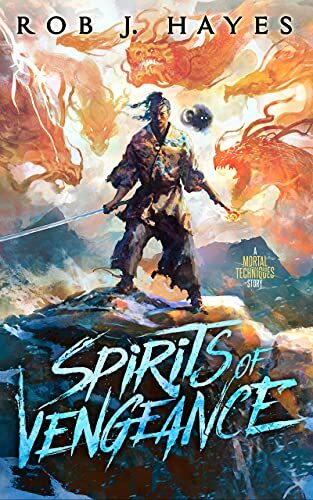
It came down to a vote between Spirits of Vengeance by Rob Hayes, and The Thirteenth Hour by Trudie Skies.
We went back… and forth… and back and forth again. We were so fortunate to have such a strong batch, and I have to commend all the other amazing books for the impression they made on the whole team.
Eventually, our votes came to a cohesive answer…
Anyone got a drumroll for us?
Beth: As you can see we had our hands full finding our champion! Honestly, our champion could have been any number of books, but we chose a story that we felt was the most concise, sharply written, entertaining, that appealed to us as a group.
And the champion for Before We Go Blog’s SPFBO8 is The Thirteenth Hour, book 1 of the Cruel Gods by Trudie Skies!
But wait there’s more….
Because we had so many incredible books in our group, we decided to do something not often done in this competition and that is to select a Senlin. The Senlin Safety Net is there if a blog feels it has two books both worthy of being finalists, and one of those will be offered to the other groups if they would like to pick it up.
Becky M has a video explaining the whole concept very well, from last year’s SPFBO cycle:
For our Senlin we, as a group, have selected, Spirits of Vengeance by Rob Hayes.
Spirits is up for the taking folks.
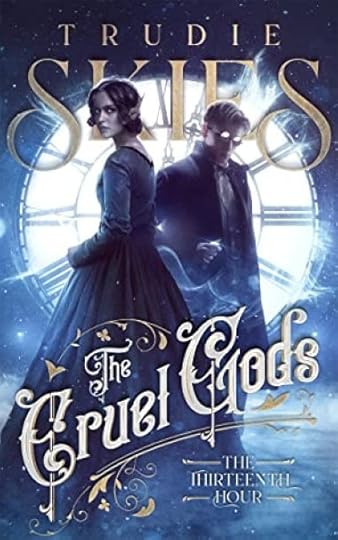 Congrats Trudie!
Congrats Trudie!
For the SPFBO finalist board, we have collected the scores from everyone who read The 13th Hour, and averaged them out.
BEFORE WE GO gives The 13th Hour a score of 8.5
THE THIRTEENTH HOUR•THE THIRTEENTH HOUR•THE THIRTEENTH HOUR•THE THIRTEENTH HOUR•THE THIRTEENTH HOUR•THE THIRTEENTH HOUR•THE THIRTEENTH HOUR•THE THIRTEENTH HOUR•
The post #SPFBO8 Finalist Announcement! appeared first on BEFOREWEGOBLOG.
October 23, 2022
Review – OBSIDIAN: AWAKENING by Sienna Frost
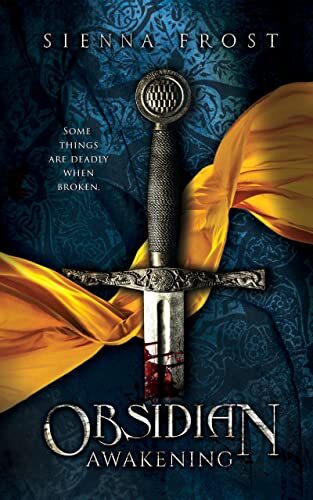 “Obsidian: Awakening” by author Sienna Frost was a book I kept hearing about via social media circles as having all the main elements in a fantasy novel I crave: engaging characters, captivating writing, compelling themes. So, after salivating over the gorgeous cover, pressing “buy” was not a difficult decision. I’m so glad I did! It was an incredible book!
“Obsidian: Awakening” by author Sienna Frost was a book I kept hearing about via social media circles as having all the main elements in a fantasy novel I crave: engaging characters, captivating writing, compelling themes. So, after salivating over the gorgeous cover, pressing “buy” was not a difficult decision. I’m so glad I did! It was an incredible book!
In the opening of the book, the dangerous prince and heir to the Salar of Rasharwi, who has just been victorious in battle over some of his enemies, intervenes before a Bharavi woman can be ravished by one of his generals. The prince demands the woman, named Zahara, a proud tribal member of the fierce and nomadic Kha’gans, reveal the well-guarded secret location of Citara, a coveted stronghold, and threatens that he will give her over to all of his soldiers to be brutally raped and killed if she does not comply. But the woman refuses. The prince is impressed by the woman’s bravery and intellect, and decides to make her one of his wives, against the woman’s will. She vows revenge – she will do what she has to do, but one day vows to see the Prince, who later becomes the Salar, dead.
Zahara goes on to become the favourite wife of the Salar, and the one who will never capitulate to him, since he has murdered her whole family. She also bears the Salar a favoured son, Lasura, who must fight for dominance and his very life among his many half-brothers from various other wives of the Salar.
Meanwhile, Hasheem, an assassin, and former slave and prostitute, after a woman is found dead in his room, is ordered by his Machiavellian mentor and employer, Deo Di Amarra, to flee. Hasheem finds himself captured by the daughter of the fabled warlord, the Kha’a of Visarya. The daughter, Djari, ends up taking Hasheem into her service as her sworn protector. Djari’s powerful brother, Nazir, who is a seer, has his doubts about his sister’s new protector, and how close their relationship is becoming. But Nazir is hiding secrets of his own, and his dalliance with a sworn enemy could also have sweeping repercussions for his Kha’gan.
A covetous empire seeks to subjugate wandering desert clans, and all the aforementioned characters will have a role to play in what the bloody outcome is.
The characters felt so real to me: they truly leapt off the page, but that does not mean they will always be likeable, which is just fine with me!
The reader might find an absence of a true hero or heroine in this book. The highly flawed and complex characters peddle in revenge, treachery, naked ambition, lust, and their motivations are always complex, however surprisingly these motivations are not typically self-serving.
Each person has a unique and sometimes twisted code of honour, where they will gladly sacrifice themselves for a greater good, another person they care about, a larger group, or simply to accomplish their own personal mission. This makes for a fascinating read, where the characters are unpredictable and unceasing in what lengths they will go to in order to achieve their ends.
These characters are not just resolved – they are relentless, as implacable as the heat of the Black and White Desert that beats down upon them. Only death can destroy their determination.
Moreover, Frost adeptly gives us several main characters who are on opposite sides of a long and bitter conflict. Part of the author’s skill is that the reader may find themselves torn as to who they want to win, and who they want to live, despite the flaws of the primary characters. For survival for all will be impossible.
Frost uncompromisingly shows the reader the harsher side of human nature. Reader beware: this book is very dark, not light-hearted in the least. The novel delves into some challenging themes, and not while everything is depicted graphically or even depicted at all, they are referred to, and their implications and consequences are discussed.
These include but not limited to: torture, hatred, enslavement, prejudice, rape, murder, sexual abuse of children, forced prostitution, genocide. This is a brutal world being portrayed. That said, love, self-sacrifice, devotion, bravery, family, honour are also to be found within “Obsidian: Awakening”, and the book is not completely devoid of hope.
But perhaps the theme that gripped me the most was that of leadership. What leaders must do not only to maintain power, but to protect, shelter, clothe and feed, and inspire their people. How leaders must push their people to the edge of what they believe are their limitations, and then push some more, if need be, for the greater good.
I loved the sometimes completely amoral, scheming politics, reminiscent of my favourite fantasy books such as “A Song of Ice and Fire” by G.R.R. Martin. The rival tribes, the fight for supremacy, if not existence, the many nobles always seeking a way to best each other, the spying, subterfuge, and betrayals. If you like that sort of court intrigue in your fantasy, adding piquancy to the tale, this is your book.
Vivid, Middle-Eastern inspired worldbuilding, full of sand-blasted deserts, elegant cities, and feuding Kha’gans, I loved the customs, cultures, landscapes of the book. If I have a quibble here, it would be that a character list and maps would have been helpful to keep things sorted.
Frost’s prose is simply incredible, and had me yearning for more. Some books, one can lose oneself in the actual writing, not merely the story, and this was one of those books for me. The opening lines had me enraptured, and I knew right from there this book was going to be for me.
“One moonless night, under the star-stained, crushing sky of the desert, where the snow-capped peaks of the Vilarhiti drew and unconvincing line between the realms of gods and men, Fate brought together one man and one woman from opposite sides of the war, and bestowed upon them the first chance to bring peace to the peninsula. It was also on this night, in a tent of stumbling shadows and raining stars, when peace was offered, declined, and set on fire by the woman and the man, and the secret wager that began the greatest war between the Black and White Deserts was made.”
The book is not fast-paced. It takes its time, lovingly, to explore the characters and the story. That said, the action scenes were frenetic and very well-contrived. Combined with the tense political maneuvering and heady, passionate, love scenes, and simply fantastic writing, there’s plenty in the book to keep the pulse racing, even if the action is not non-stop.
Impeccably written, immaculately illustrated, thought-provoking, thrilling, Obsidian: Awakening is a feast for the senses. I urge you to buy it in physical form so that you can fully appreciate the beautiful cover and pictures to be found within the novel. A contender for my favourite book of the year, don’t miss this one!
Buy from Amazon
OBSIDIAN: AWAKENING•OBSIDIAN: AWAKENING•OBSIDIAN: AWAKENING•OBSIDIAN: AWAKENING•OBSIDIAN: AWAKENING•OBSIDIAN: AWAKENING•OBSIDIAN: AWAKENING•OBSIDIAN: AWAKENING•
The post Review – OBSIDIAN: AWAKENING by Sienna Frost appeared first on BEFOREWEGOBLOG.
The Books that Made Me: Dragonsong by Anne McCaffrey
Swift born, dream bound and rudderless, her captain and crew are me.
We’ve sailed a hundred sleeping tides where no seaman’s ever been
And only my white-winged craft and I know the wonders we have seen.”
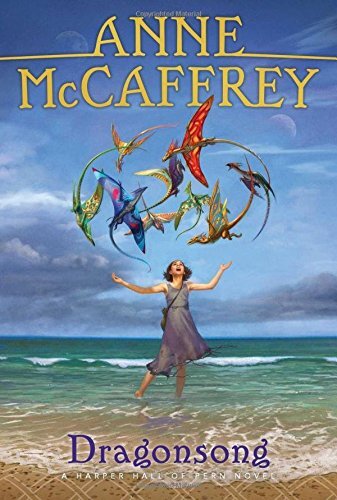 I was very worried about growing up when I was a kid.
I was very worried about growing up when I was a kid.
This was for all sorts of reasons – acid rain and animal testing, the Falklands War and the Berlin Wall, uncomfortable clothes, and cars – but most of all it was because Adults didn’t believe in magic. They didn’t appear to enjoy themselves in any of the ways I understood, they didn’t look for fairy-rings or chase rainbows or make wishes, and they didn’t read any good books.
Fortunately, it turned out that I was wrong about that last thing.
One evening after school, having exhausted the library’s children’s shelves, I made my way nervously into the adult section. Here, the shelves were taller and darker, being further away from the large window at the front of the building and it was quiet, almost empty of people, as I scanned the shelves. I didn’t know what I was looking for. I was pretty sure there wouldn’t be anything wonderful here, but I was out for whatever I could get when my eye snagged on the word ‘dragon’. I pulled out Dragonsong and Dragonsinger, not quite daring to hope that I’d found something good. Something magical. Taking the beautiful dragons that illustrated the two covers as a good sign, I borrowed both books, and began reading Dragonsong on the way home.
I had not found something magical. I had found something even better than that, something I had not imagined, a whole new world (literally) that followed different rules and was populated with different creatures. I found fire-lizards and dragons, and the Harper Hall, I found new friends in Menolly and Piemur, and I found Thread and the Dragonriders who fought it. Dragonsong was not then, and will never be, the greatest book I’ve ever read. But it is the book that opened up the adult section of the library for me. That encouraged me to start digging through my parents’ bookshelves again, in search of treasure that I now knew I might find.
I devoured the Pern books after this beginning, loving every instalment more than the last as I learned more about the planet and its settlement, about the Oldtimers and the Ancients, about how the dragons were created, and how the technology and history of the original colonists was lost, and then found. I made more friends: Masterharper Robinton, Jaxom and his white dragon Ruth, Nerilka, and Sorka and Sean. When the dolphins showed up I jumped ship, moving onto McCaffrey’s Crystal Singer trilogy and then onto The Ship Who Sang before discovering that there were other authors who did even more incredible things with space and time. Pratchett’s Discworld became my new obsession, but I still reread the Pern books in between all my new discoveries.
I still own copies of the two books that tell Menolly’s story. I haven’t read them in years, but I keep them as a reminder. There are lots of beginnings in a life and it’s good to mark some of them, the important ones. Dragonsong helped sooth one of my biggest childhood worries and I took it as a promise. It was a promise that Adults hadn’t really given up on magic, they were just keeping it secret and safe. There would still be good books to read, and therefore, adulthood might not be so bad after all.
So far, so good.
Buy from Amazon
DRAGONSONG•DRAGONSONG•DRAGONSONG•DRAGONSONG•DRAGONSONG•DRAGONSONG•DRAGONSONG•DRAGONSONG•
The post The Books that Made Me: Dragonsong by Anne McCaffrey appeared first on BEFOREWEGOBLOG.




